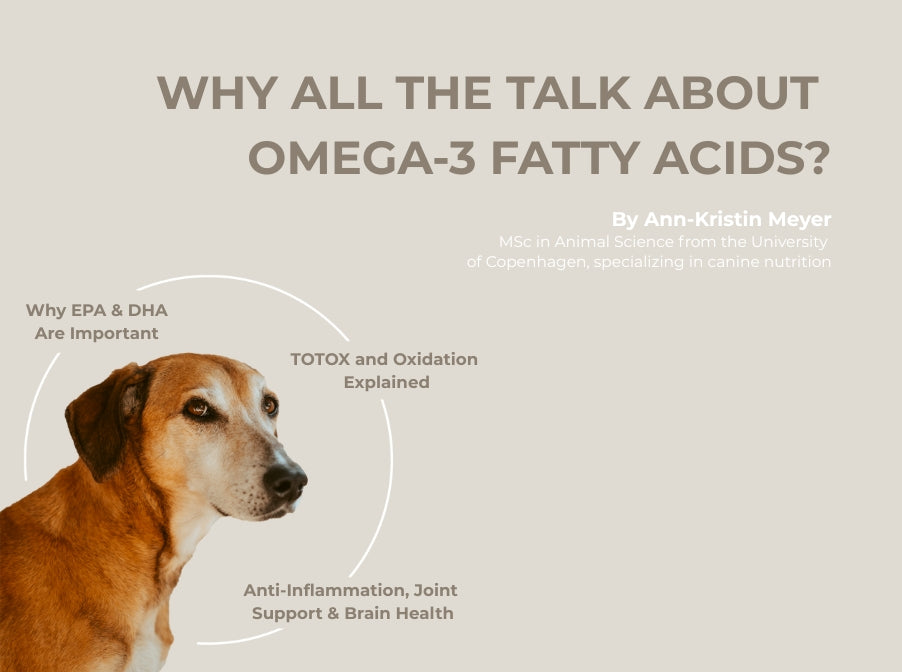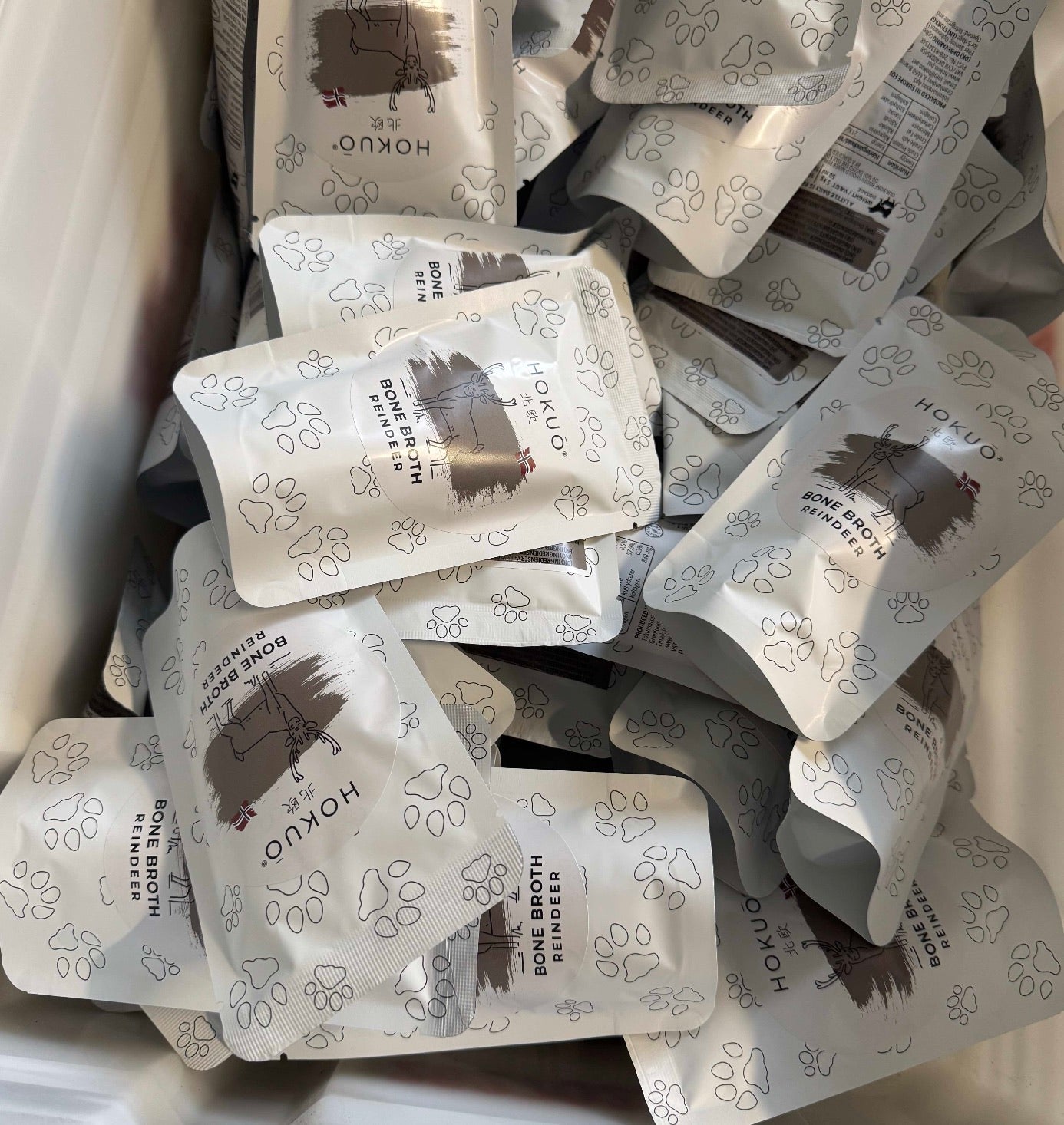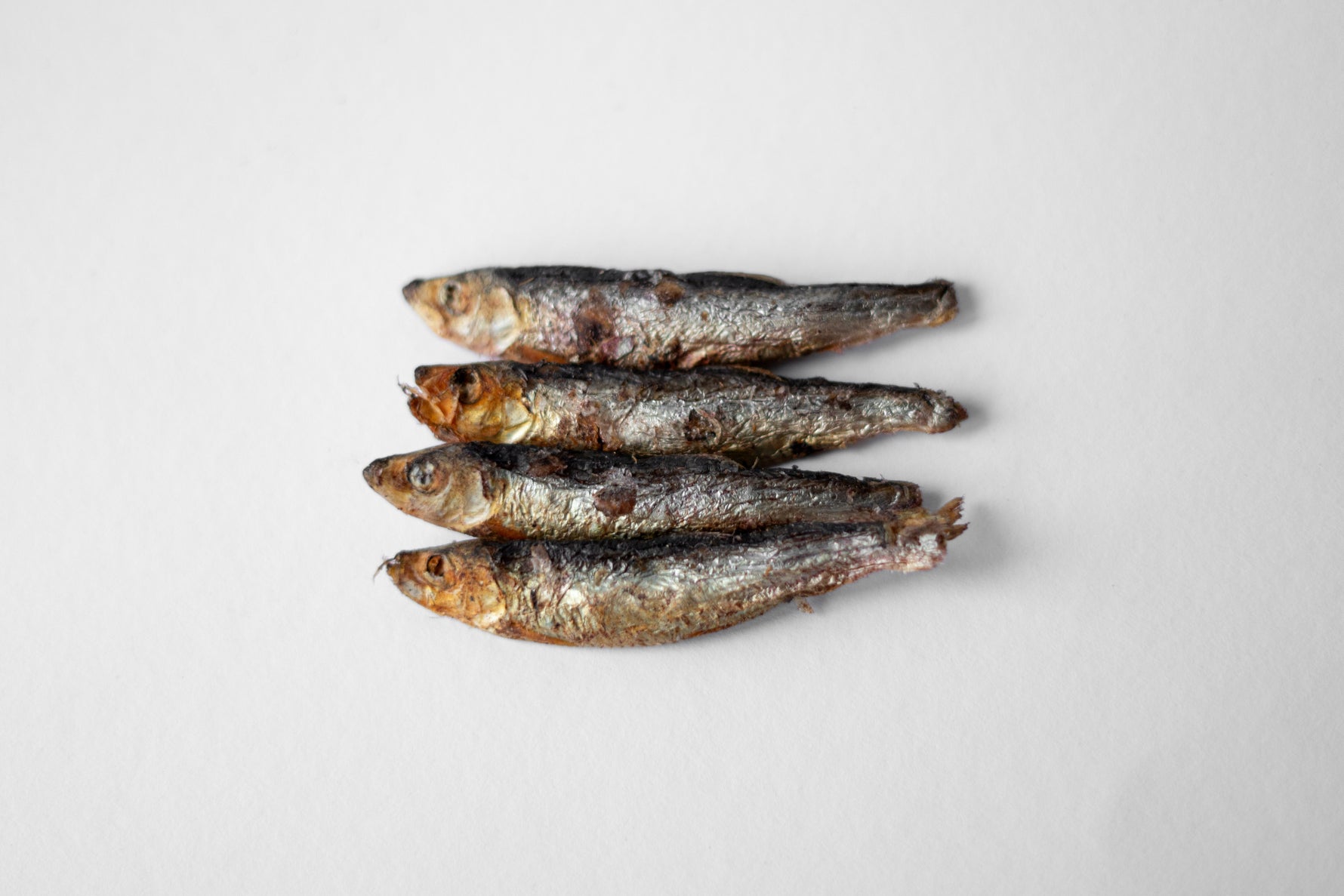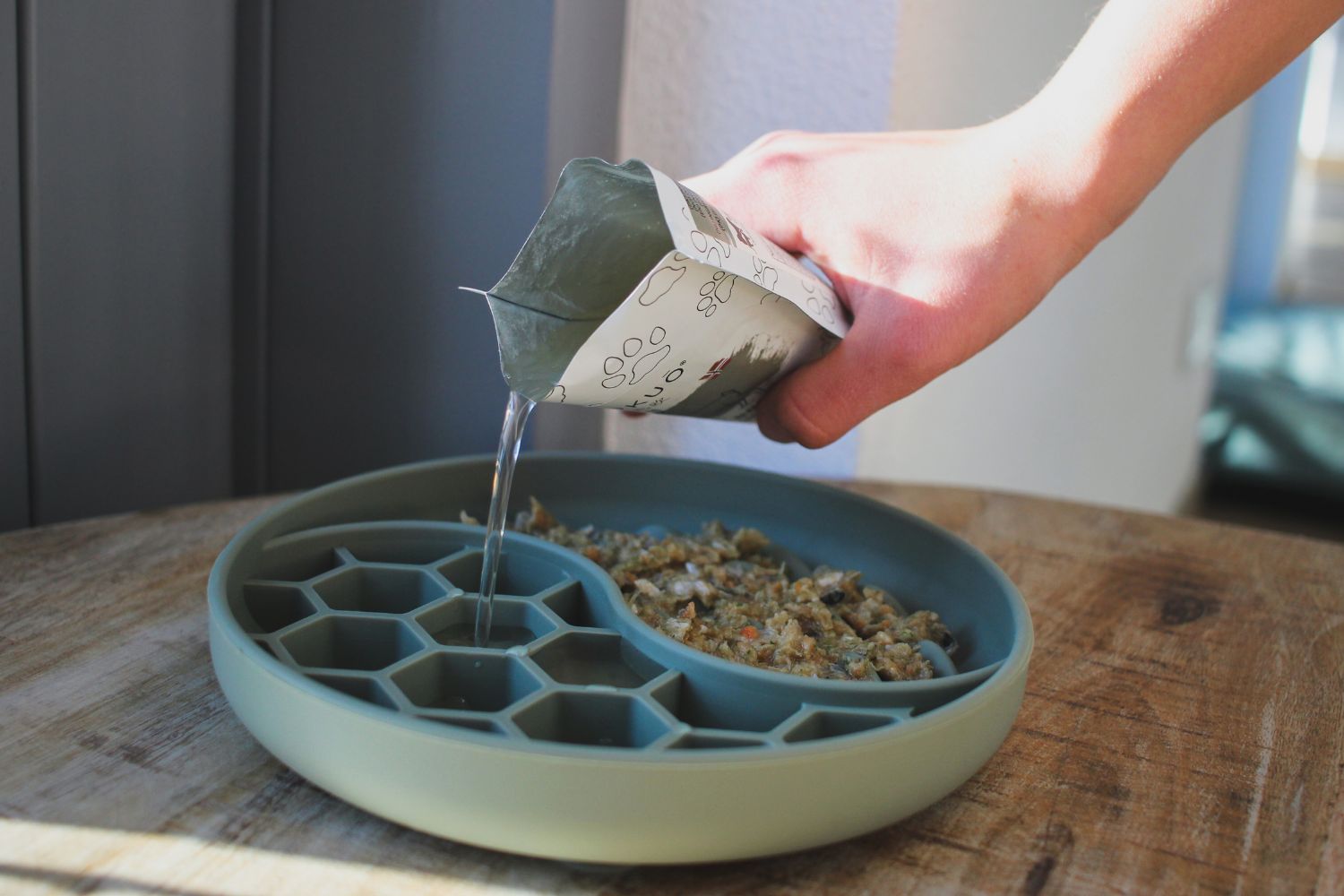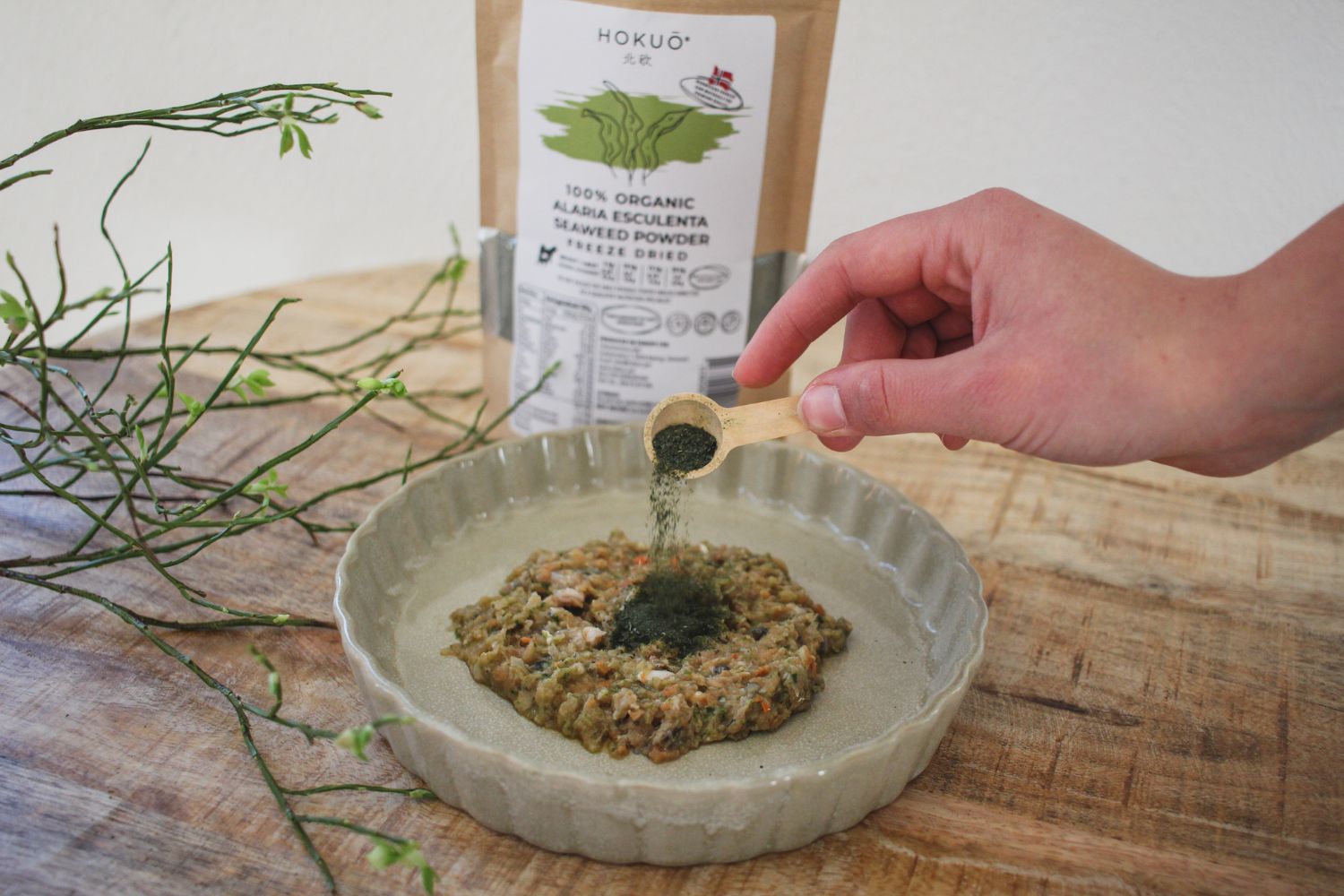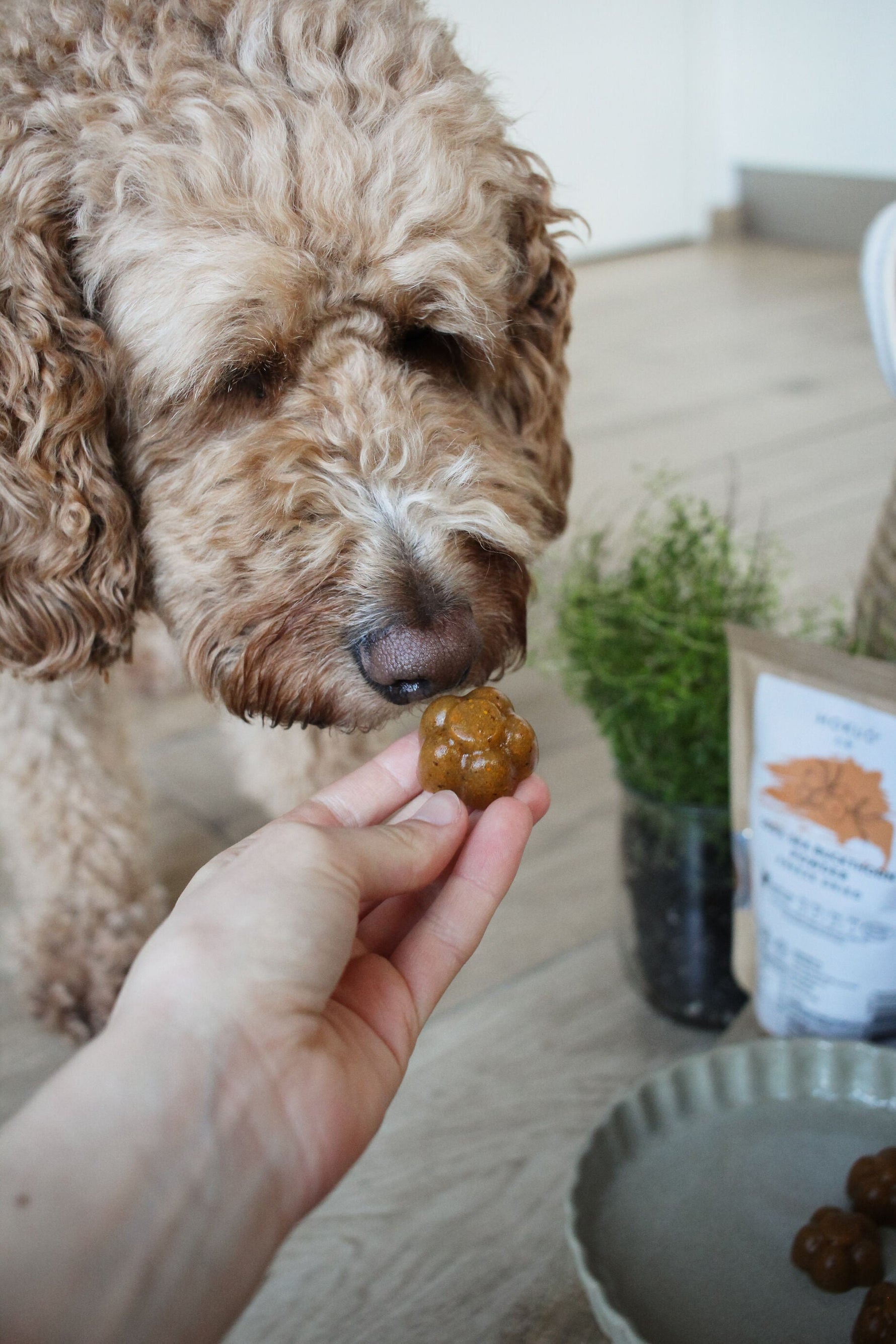Why All the Talk About Omega-3 Fatty Acids?
If you own a dog, chances are you’ve been part of at least one conversation about dog food. And quite often, that conversation ends up focusing on one specific nutrient: omega-3 fatty acids. But why is there so much hype around omega-3s in dog food? What makes omega-3 fatty acids so special compared to other nutrients? And what should you be aware of when choosing omega-3 supplements for your dog? That’s exactly what you’ll learn in the following.
Table of Content
What Are Omega-3 Fatty Acids? Which Omega-3 Fatty Acids Exist? The Vital Physiological Functions of EPA and DHA It Doesn’t Stop There What to Know When Choosing and Storing Omega-3 Supplements for Your Dog Next Time You’re at the Dog Park…
What Are Omega-3 Fatty Acids?
Omega-3 fatty acids are polyunsaturated fats essential to a range of physiological processes. They belong to the group of long-chain fatty acids, making them particularly reactive and biologically active. That’s important to keep in mind when selecting an omega-3 supplement—and knowing how to store it properly.
Because dogs can’t produce sufficient amounts of omega-3 fatty acids on their own, they must be supplied through the diet. This makes omega-3s essential nutrients for dogs.
See Product
Which Omega-3 Fatty Acids Exist?
The omega-3 fatty acids most commonly discussed in canine nutrition are alpha-linolenic acid (ALA), eicosapentaenoic acid (EPA), and docosahexaenoic acid (DHA). While all three are omega-3s, they are not equal when it comes to feeding your dog. ALA is found in many plant-based oils like flaxseed oil, hemp seed oil, and chia oil, and can be converted in the body into EPA and DHA. However, dogs are not very efficient at converting ALA—only about 5–10% of it becomes EPA, and less than 1% becomes DHA.
This means that plant oils—except one—can’t replace ingredients rich in EPA and DHA. That exception is algae oil, which is the only plant-based oil rich in both EPA and DHA. All other significant sources of EPA and DHA come from marine sources like fish, mussels, krill, and algae.
Why EPA and DHA Are So Important
You might ask, “Why can’t I just use a good plant oil rich in ALA?” It’s usually easier and more affordable. The answer lies in the broad spectrum of physiological effects that EPA and DHA offer—but ALA does not.
Although ALA is an essential fatty acid on paper, its main purpose is to serve as a precursor to EPA and DHA. And since dogs can barely make that conversion, ALA is not physiologically sufficient. It can’t meet your dog’s real omega-3 needs, especially in cases of inflammation, pregnancy and lactation, brain development in puppies, or skin and coat issues.
Here’s the catch: if you're aiming for a low omega-6 to omega-3 ratio (for good reason, which we'll get into later), you can't solely rely on the numbers listed by dog food manufacturers. A ratio of 4:1 or 3:1 might look great—but if the omega-3s come primarily from ALA, the food won’t have the desired effect.
The upside? You don’t need to worry about your dog getting enough ALA. You can focus entirely on EPA and DHA.
Wild-caught Baltic Sprat Graphic © Hokuō®
New Zealand Green-Lipped Mussel Graphic © Hokuō®
The Vital Physiological Functions of EPA and DHA
Anti-inflammatory Properties
One key reason is EPA’s anti-inflammatory effect. This is where the omega-6 to omega-3 ratio becomes highly relevant. Arachidonic acid (AA), an omega-6 fatty acid, and EPA are both processed in the body via the same enzymatic pathways: cyclooxygenase (COX) and lipoxygenase (LOX). These enzymes convert the fatty acids into eicosanoids, hormone-like messengers that help regulate inflammation.
When AA is processed, it mainly creates eicosanoids that promote inflammation, pain, fever, and the attraction of white blood cells—essential during an acute infection. But too much AA activity can lead to chronic inflammation.
EPA, on the other hand, is converted into eicosanoids that counteract inflammation. Since EPA and AA compete for the same enzymes, a higher EPA concentration in the bloodstream helps reduce the dog’s inflammatory response.
EPA and DHA are also precursors to specific signaling molecules that actively resolve inflammation and support tissue repair.
Role in Joint Health and Osteoarthritis
This anti-inflammatory action is also why omega-3s play such a key role in managing osteoarthritis. Osteoarthritis is a low-grade, chronic inflammation of the joints. The anti-inflammatory properties of EPA and DHA can reduce joint swelling, pain, and stiffness.
Studies have shown that dogs with osteoarthritis supplemented with marine omega-3s walked better and longer, showed less pain behavior, and needed fewer NSAIDs. There’s also potential for EPA and DHA to slow down the progression of osteoarthritis by reducing cartilage breakdown.
Brain Development and Cognitive Function
Marine omega-3s aren’t just good for inflammation—they’re also crucial for brain health. DHA, in particular, is vital for nervous system development in puppies and maintaining cognitive function in older dogs. That’s not surprising, given that DHA is a key structural component and the most abundant fatty acid in the canine brain.
Several studies suggest that puppies given DHA supplements after weaning learn faster, show improved cognition, and have better memory compared to those that didn’t get DHA. The same applies to puppies whose mothers received DHA during pregnancy—they performed significantly better in behavioral and cognition tests.
It Doesn’t Stop There
And no, the benefits don’t stop here. EPA and DHA also support the skin barrier, contributing to better skin and coat health. The cardiovascular system also benefits from marine omega-3s, and DHA has been shown to improve not only cognition but also visual development in puppies.
A recent observational study even suggests that including marine omega-3s in puppy diets may significantly reduce the risk of epilepsy later in life.
What to Know When Choosing and Storing Omega-3 Supplements for Your Dog
Choose fish oils or other omega-3 supplements from sustainable sources that are tested and purified for contaminants like heavy metals and PCBs.
Omega-3s are very sensitive to oxidation (remember: highly reactive and biologically active). Oxidized fats are not just ineffective—they can actually harm your dog’s tissues by forming free radicals. The Totox value (short for total oxidation) is a measurement of how oxidized an oil is. The lower the Totox value, the less oxidized the oil. Aim for a Totox value under 5. Unfortunately, this value isn’t always disclosed by the manufacturer.
Store omega-3 supplements in a way that protects them from light, heat, and oxygen. Keep them in the fridge and use them within a few weeks.
You can also meet your dog’s omega-3 needs by including fatty fish in their regular diet. Depending on the amount of fish, additional supplementation may not be necessary. Many complete dog foods also contain marine omega-3s—but just like supplements, they’re vulnerable to oxidation. So by the time the food reaches your dog’s bowl, the omega-3s might have lost their effectiveness.
This depends on many factors: the quality of the omega-3 source, how the food is packaged, how long it’s been stored by the manufacturer, the retailer, and you—and even the size of the food bag, which affects how long the food is exposed to oxygen.
See Product
See Product
Next Time You’re at the Dog Park…
Next time you’re out in the dog park and the topic of dog food and omega-3s comes up, chances are you’ll know more than anyone else in the conversation—and you might even have a tip or two to share.
Sources:
Antonelli, C. et al. (2023). Effects of docosahexaenoic acid dietary supplementation on cognitive learning and memory in healthy puppies. Animals, 13(20), 3261.
Bauer, J. E. (2011). Enhancing canine cognition with omega-3 fatty acids. Nestlé Purina Nutrition Forum.
Bauer, J. E. (2006). Therapeutic use of fish oils in companion animals. Journal of the American Veterinary Medical Association, 229(11), 1761–1764.
Bauer, J. E. et al. (2018). Evaluation of enrichment of diets with omega-3 fatty acids and effects on plasma fatty acid profiles in dogs and cats. Journal of the American Veterinary Medical Association, 252(12), 1470–1478.
Calder, P. C. (2017). Omega-3 fatty acids and inflammatory processes: from molecules to man. Biochemical Society Transactions, 45(5), 1105–1115.
Carlisle C. et al. (2024). The Effects of Omega-3 Supplementation on the Omega-3 Index and Quality of Life and Pain Scores in Dogs. Animals, 14(21):3108.
Freeman, L. M. et al. (2010). The role of nutritional supplements in cardiac disease. Journal of Veterinary Cardiology, 12(3), 149–155.
Fritsche, K. L. et al. (2010). Omega-3 polyunsaturated fatty acids and immune regulation. British Journal of Nutrition, 104(Suppl 2), S1–S9.
Heinemann, K. M. et al. (2005). Docosahexaenoic acid supplementation during pregnancy and lactation affects visual, cognitive, and behavioral development in dogs. Journal of Nutrition, 135(8), 1960S–1964S.
Hemida M. et al. (2023). Assessing the association between supplemented puppyhood dietary fat sources and owner-reported epilepsy in adulthood, among Finnish companion dogs. Frontiers in Veterinary Science, 10:1227437.
Lenox, C. E. & Bauer, J. E. (2013). Potential adverse effects of omega-3 fatty acids in dogs and cats. Journal of Veterinary Internal Medicine, 27(2), 217–226.
Logas, D. & Kunkle, G. A. (1994). Clinical response of canine pruritus to dietary supplementation with omega-3 and omega-6 fatty acids. Veterinary Dermatology, 5(3), 99–104.
Packer, R. M. A. et al. (2023). Fish-based fat sources in puppyhood are associated with reduced risk of idiopathic epilepsy in adult dogs. Frontiers in Veterinary Science, 10, 1202192.
Roush, J. K. et al. (2010). Evaluation of the effects of dietary supplementation with fish oil omega-3 fatty acids on weight bearing in dogs with osteoarthritis. JAVMA, 236(1), 67–73.
Shahidi, F. & Zhong, Y. (2010). Lipid oxidation and improving the oxidative stability. Chemical Society Reviews, 39(11), 4067–4079.
Zicker, S. C. et al. (2012). Cognitive and behavioral effects of dietary supplementation with fish oil in senior dogs. The Veterinary Journal, 192(3), 426–431.
Zicker, S. C. et al. (2012). Evaluation of cognitive function in puppies fed dietary docosahexaenoic acid. Journal of the American Veterinary Medical Association, 240(8), 935–941.
The Author: Ann-Kristin Meyer
MSc in Animal Science from the University of Copenhagen, specializing in canine nutrition, Owner of HundeFoderNørden
3 Easy Summer Lickmat Recipes for Cats & Dogs
Read more
Bone Broth for Dogs and Cats: Liquid vs Dehydrated?
Read more
How Are Freeze Dried Treats for Cats and Dogs Made?
Read more
